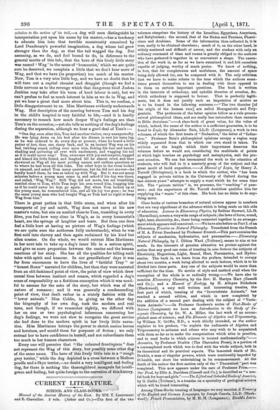CURRENT LITERATURE.
SCHOOL AND CLASS-BOOKS.
Manual of the Ancient History of the East. By MM. T. Lenormant and E. Chevallier. 2 vols. (Asher and Co.)—The first of the two volumes comprises the history of the Israelites, Egyptians, Assyrians', and Babylonians ; the second, that of the Medea and Persians, Phoeni- cians and Arabians. Some of the information thus collected is, it is- true, easily to be obtained elsewhere; much of it, on the other hand, is. widely scattered and difficult of access, and the student with only an ordinary command of time and means is greatly obliged to the authors- who have gathered it together in so convenient a shape. The execu- tion of the work is, as far as we have examined it and felt ourselves capable of judging, worthy of much praise. We know of nothing,. in fact, that for completeness and usefulness, the amount of space being duly allowed for, can be compared with it. The only criticism. that we have to make relates to the tone which the authors some- times permit themselves to use in dealing with those opposed to to them on certain important questions. The book is written in the interests of orthodoxy, and upholds theories of creation, &c.
which orthodoxy is supposed to favour. That is perfectly legiti- mate, but it does not justify such an imputation of motive as. is to be found in the following sentence :—" The two theories [of the origin of the human race] are called Monogenistie and Poly- genistic. The professors of the latter opinion follow as a rule precon- ceived philosophical ideas, and are really less naturalists than enemies to Bible doctrines."—A class-book of great value, for the value of which, indeed, the name of the author is a sufficient guarantee, is to be found in Logic, by Alexander Bain, LL.D. (Longmans), a work in two volumes, of which the first treats of "Deduction," the latter of "Induc- tion." Professor Bain's philosophical opinions occupy a region very widely separated from that in which our own stand is taken. To. criticize at the length which their importance deserves the volumes before us would not, considering the multitude of points' at which logic touches on psychology and metaphysics, suit the pre- sent occasion. We can but recommend the work to the attention of students, who will find in it a masterly grasp of the subject and the great merit of lucid exposition.—A Manual of Logic, by Henry J. Turrell (Rivingtons), is a book in which the author, who "has been- engaged in private tuition in the University of Oxford during the last sixteen years" attempts to supply a want which he for some time felt. The " private tuition" is, we presume, the " coaching " of pass- men ; and the experience of Mr. Turrell doubtless qualifies him for supplying the " wants " of this class. His book has no claim to do any- thing more.
































 Previous page
Previous page